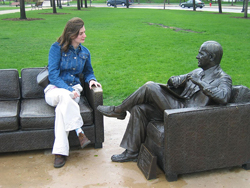|
Problem Solving TechniquesSolution Based Approachesby Tim Nichol age-well.org > self-improvement articles > problem solving techniques "The talent for being happy is appreciating and liking what you have, instead of what you don't have." Woody Allen The Problem is the Problem!
Solution based approaches to problem solving is one of the problem solving techniques that seems to work time and again. When things go wrong in our lives and we are confronted with seemingly insurmountable problems, all we can think about is the problem. Our brains are completely taken over by thoughts around the problem. There is no room for anything else. We worry and fret and probably lose appetite and large helpings of valuable sleep so we become not only anxious but weakened and exhausted too. A vile cocktail. In the past such sufferers would have gone to a therapist or another to discuss the problem further and to rake up all the whys and wherefores of the situation all over again, looking for the cause of the difficulty to find out where the fault lay. Sadly very often the conclusion points the finger at the client or their hapless parents. The therapist would hand out professional advice as to what the client should or ought to do. A recent visitor to such a therapist was introduced by the client being invited to fill in a questionnaire that stretched over two-sides of A4 in a dense text. It was designed to assess the possibility of the victim self harming or harming others. This was followed by the retelling of the troubled man’s catalogue of woes. No wonder he concluded, “I was feeling low before I came to you and now I feel bloody depressed and no wonder!” For some, visits to such therapists, become a regular feature of their lives (if they can afford it) much like brushing their teeth, but not as much fun. An Empowering PerspectiveIn this article, I want to introduce you to Solution Focused Approaches as a refreshing alternative to the above. Solution Focused Approaches address such problems from a different and more empowering perspective. The above example is one of the problem solving techniques that focuses upon what is broken and not working and ignores the strengths and resources of the client. It homes in on what is not working well and ignores the more positive moments in that person’s life. It compounds the problem of concentrating on the problem, giving the client more miserable ammunition to chew over, after the session. The therapist hands down advice from upon high, without considering that the client herself or himself might also have useful ideas to improve the situation or her/his own problem solving techniques for coping with difficulties. Here is a powerful example of a solution focused approach. How will you know it was worth doing this?A woman went to a therapist friend of mine for help. “How will you know that coming to see me was the right thing to do? What would you notice that would tell you that it had been helpful?” After some moments silence she responded, “I don’t know how to answer that. You see I’ve been told I have cancer and that I can’t expect to live much longer than six months. It all feels so hopeless…” He expressed his concern and talked about how difficult it must feel and the he asked, “If you didn’t have cancer what would you want to do?” She smiled wistfully, “I’d probably lash out on a visit to a hairstylist, a really expensive one..” “What difference would that make to you?” “I’d feel a bit more special and even a bit glamorous!” “What else would you do?” he prompted. “I’d have to go shopping to buy myself a nice suit to go with my new hairstyle, wouldn’t I?” “And that would be good for you?” “Oh yes I always enjoyed shopping before I was ill…. I could still do that couldn’t I?” she beamed at the possibility. She also went on to talk about her long term wish which had been to visit Paris and see the sights. I could take my daughter…..
The session ended and Chris heard nothing more of this lady until a postcard came to him at the office. It was a view of the Eiffel Tower and the message read. “Thanks for helping me to realise what was possible! You have made me so happy!” She died soon after. Thinking Beyond the ProblemThe therapist was using a solution focused approach that helped her to think beyond the problem. At no time did he tell his client what she should or should not do. He helped her to set aside the huge problem for a short while and gave her the space to think creatively. By doing so, the quality of life of the woman was richly enhanced. The solution focused therapist has a number of elegant prompts and questions to help clients move on in a number of situations. It is an effective approach for young and old, for individuals and for groups. Over the next weeks and months I will provide further examples of this powerful and apparently simple approach, a lesser known example of problem solving techniques that can help solve, sometimes previously insurmountable problems fairly rapidly. I hope that it will help you to look at your situation in a new and refreshing manner, and thereby find a solution.
age-well.org > self improvement articles > problem solving techniques Top of Problem Solving Techniques Home to age-well.org |
Translate this Site
Search This Site
Loading
Subscribe to E-Zine
Support this Site
|
Holiday SpecialsFor Holiday Specials at Amazon, Click Here
|
| |||||





